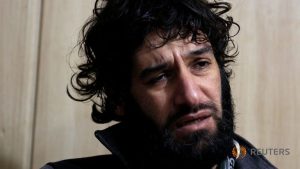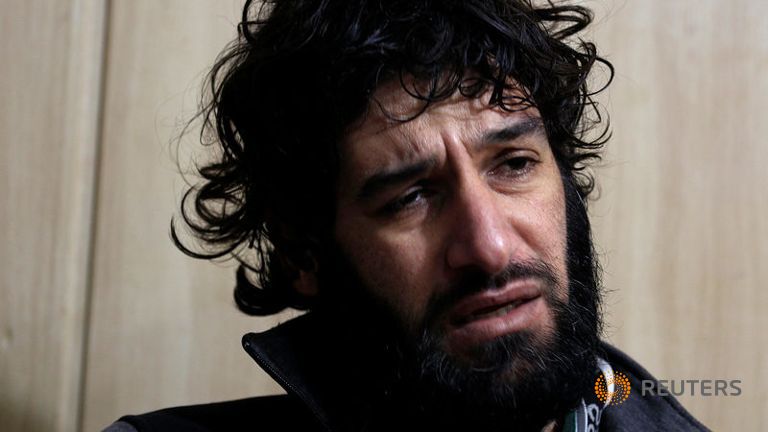
Islamic State militant Amar Hussein says he reads the Koran all day in his tiny jail cell to become a better person. He also says he raped more than 200 women from Iraqi minorities, and shows few regrets.
Kurdish intelligence authorities gave Reuters rare access to Hussein and another Islamic State militant who were both captured during an assault on the city of Kirkuk in October that killed 99 civilians and members of the security forces. Sixty-three Islamic State militants died.
Hussein said his emirs, or local Islamic State commanders, gave him and others a green light to rape as many Yazidi and other women as they wanted.
“Young men need this,” Hussein told Reuters in an interview after a Kurdish counter-terrorism agent removed a black hood from his head. “This is normal.”
Hussein said he moved from house to house in several Iraqi cities raping women from the Yazidi sect and other minorities at a time when Islamic State was grabbing more and more territory from Iraqi security forces.
Kurdish security officials say they have evidence of Hussein raping and killing but they don’t know what the scale is.
Reuters could not independently verify Hussein’s account.
Witnesses and Iraqi officials say Islamic State fighters raped many Yazidi women after the group rampaged through northern Iraq in 2014. It also abducted many Yazidi women as sex slaves and killed some of their male relatives, they said.
Human rights groups have chronicled widespread abuses by Islamic State against the Yazidis.
Hussein said he also killed about 500 people since joining Islamic State in 2013.
“We shot whoever we needed to shoot and beheaded whoever we needed to beheaded,” said Hussein.
He recalled how emirs trained him to kill, which was difficult at first when one person was brought for a practice kill. It became easier day by day.
“Seven, eight, ten at a time. Thirty or 40 people. We would take them in desert and kill them,” said Hussein, an imposing, well-built figure, who was wearing metal handcuffs.
Eventually, he became highly efficient, never hesitating to kill.
“I would sit them down, put a blindfold on them and fire a bullet into their heads,” he said. “It was normal.”
TROUBLE
Counter-terrorism agents said Hussein was trouble when he first arrived. “He was so strong he snapped the plastic handcuffs off his wrists,” said one.
Hussein sees himself as a victim of hardship, a product of a broken home and poverty in his hometown of Mosul, where Iraqi forces have launched an offensive against Islamic State to dislodge them from their last stronghold in Iraq.
“I had no money. No one to say ‘This is wrong, this is right.’ No jobs. I had friends but no one to give me advice,” said Hussein, who has been held in the cell with a barred window since his capture in October.
Religious slogans are scratched on its cement walls by previous jihadist prisoners. His only possessions are a thick blanket and a Koran. On the floor is a polystyrene plate with broth and some rice.
Thick, metal handcuffs hang on a nearby wall.
Hussein, now 21, began his career as an Islamic militant began when he was just 14, he said. He was drawn to jihad by his local mosque preacher, then he joined al Qaeda and now awaits legal proceedings as a member of Islamic State, the successor of al Qaeda’s Iraq branch.
Counter-terrorism agents described a second prisoner, Ghaffar Abdel Rahman, as less forthcoming, and said he had revealed little during questioning about his experiences as a checkpoint and logistics man for Islamic State.
Abdel Rahman, 31, with long hair and beard and a blank stare, gave little away in a separate interview with Reuters.
He admitted to opening fire on security forces in the raid on Kirkuk but says he never killed anyone. He said he and his brother joined Islamic State because otherwise, as state employees, they would have been killed by the group.
His Kurdish captors did not comment on his story, but Iraqi authorities are generally skeptical of fighters who say they had no choice.
Abdel Rahman’s only hint of anger came when he was asked his view of Shi’ite Prime Minister Haider al-Abadi and he suggested Iraq would always be plagued by instability because many sects live in the country.
“He (Abadi) does not provide people with justice,” said Abdel Rahman.
http://www.reuters.com/article/us-mideast-crisis-mosul-prisoners-idUSKBN15W1N0?utm_campaign=trueAnthem:+Trending+Content&utm_content=58a72d4004d3014e9a8a5c28&utm_medium=trueAnthem&utm_source=twitter
